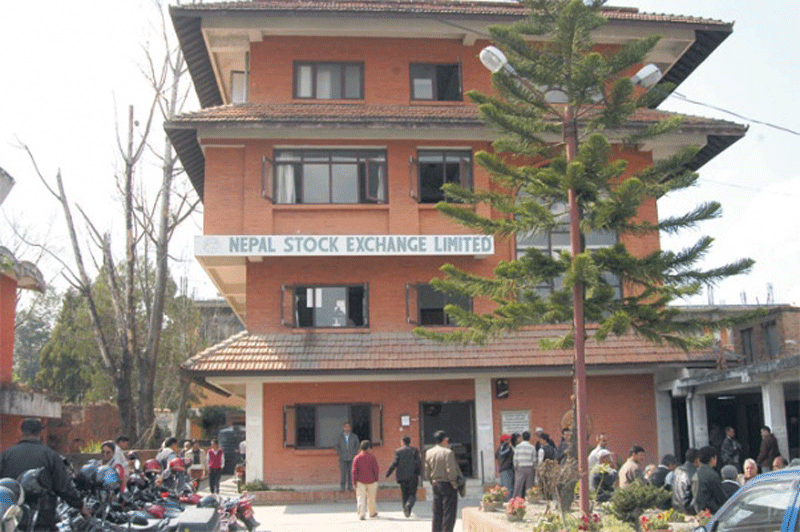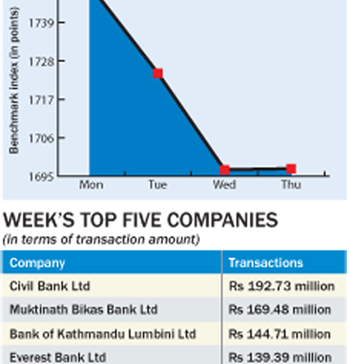
OR
Bank interest, minister statement blamed for new low in Nepse
Published On: March 27, 2018 06:00 AM NPT By: Sagar Ghimire | @sagarghi

KATHMANDU, March 27: Nepal Stock Exchange (Nepse), the only stock market of the country, crashed on Monday as the benchmark index plunged 51.89 points, or 4.25 percent, on a single day to close at 1,168.55 points. The stock market which was on a downward trend since the last few months went into a freefall on Monday as investors scrambled to sell their shares in the bearish market.
A statement by Minister for Finance, Yubaraj Khatiwada, who reportedly said on Sunday that there is no reason why stock market should not fall, has been cited as the immediate factor behind the panic sell-off among investors. The second statement on the stock market by Finance Minister Khatiwada came amid interpretation by many investors that his interview last month with the BBC Nepali radio suggesting that stock market is an unproductive sector caused stock rout.
Due to rapid fall of the benchmark index, Nepse imposed a circuit breaker in the market and suspended trading for 15 minutes. The circuit breaker is applied as a measure to give investors a chance to pause and make trading decision when there is extreme volatility in the market.
Though the remark from Finance Minister Khatiwada has weakened the confidence of investors, analysts said the major factor behind the stock slump is the hike in interest rates by banks and financial institutions (BFIs). As BFIs starved of lendable fund have raised the fixed deposit rate to 11 percent, many investors have now found bank deposits less riskier and more profitable investment opportunity.
“Investors are not getting cheaper money anymore, which was the case until last year. Instead, interest rates are rising to an ultra-high levels which mean those who were borrowing to make investment in the stock market have been opting to offload,” said a merchant bank's CEO, requesting anonymity as Securities Board of Nepal (Sebon) has ordered them not to speak to the media about the stock market. “The market was bound to go into a slump not matter who the finance minister,” added the CEO.
The stock rout on Monday alone wiped out paper wealth worth Rs 60.8 billion as the market capitalization fell to Rs 1,368.94 billion.
The market remained on a bullish trend until last year when investors were enjoying both cheaper financing facility from BFIs and stock dividend from BFIs and insurance companies who were under pressure to increase their minimum paid-up capital requirement multi-fold in line with the rule. Lured by the prospect of rights and bonus shares from BFIs and insurance companies, investors went on a buying spree which sent the stock market to a record high of over 1800 points. However, the stock market started to retreat when those rights and bonus shares got listed in the market, resulting into oversupply of securities.
“The stocks were on a peak even though the market fundamentals were not justifying the price,” said the merchant bank's CEO. “The market has now not been able to suck up the supply of shares while investors are rushing to sell so that they do not lose everything when the market falls further.”
You May Like This

No interest rather broader national interest: Minister Sharma
KATHMANDU, June 15: Minister for Home Affairs Janardan Sharma has stressed on collaboration among the political leaders and civil servants... Read More...

Janata Bank acquires Siddhartha Dev Bank
KATHMANDU (REPUBLICA): Janata Bank has completed acquisition of Siddhartha Development Bank Ltd. ... Read More...

Nepse tanks 52 points as BFIs raise interest rates
KATHMANDU, Nov 12: The Nepal Stock Exchange (Nepse) index nosedived 51.95 points this week to close at 1,697.17 points on Thursday--the... Read More...







Just In
- NRB to provide collateral-free loans to foreign employment seekers
- NEB to publish Grade 12 results next week
- Body handover begins; Relatives remain dissatisfied with insurance, compensation amount
- NC defers its plan to join Koshi govt
- NRB to review microfinance loan interest rate
- 134 dead in floods and landslides since onset of monsoon this year
- Mahakali Irrigation Project sees only 22 percent physical progress in 18 years
- Singapore now holds world's most powerful passport; Nepal stays at 98th











Leave A Comment